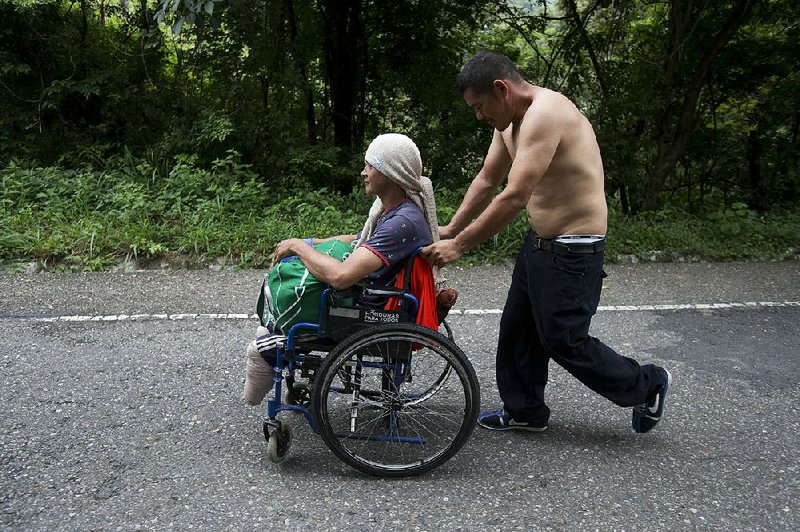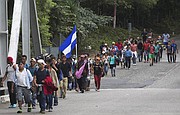MEXICO CITY -- President Donald Trump threatened Tuesday to withhold aid from the Honduran government if it did not halt a mass migration of as many as 2,000 people, mainly from Honduras, who crossed into Guatemala this week with the intention of reaching the United States.
"The United States has strongly informed the President of Honduras that if the large Caravan of people heading to the U.S. is not stopped and brought back to Honduras, no more money or aid will be given to Honduras, effective immediately!" Trump said on his Twitter account.
Late Tuesday, Trump said on Twitter that the U.S. had conveyed the same message to the governments of Guatemala and El Salvador, telling them that U.S. aid will stop if they allow their citizens to travel from or across their countries with the intent of entering the United States without permission.
"Anybody entering the United States illegally will be arrested and detained, prior to being sent back to their country!" he added.
The march began Friday in the northern Honduran city of San Pedro Sula. Moving on foot and in vehicles, the travelers crossed into Guatemala on Monday, pushed past two police roadblocks and stopped for the night in the town of Esquipulas.
Some estimates put the group's size as large as 2,000 people.
Tens of thousands of Hondurans and other Central Americans have migrated north in recent years, fleeing violence, poverty or a combination of both. Some have occasionally chosen to move in caravans -- large, semicoordinated groups -- their size offering participants some degree of security against the many perils that lurk on the migrant trail, including muggings, extortion and rape.
Such caravans have been something of an annual event for years and have mostly happened without much fanfare or international attention.
But travelers earlier this year drew the attention of Trump, who posted messages on Twitter warning that they posed a threat to American sovereignty. He used their migration to help justify the deployment of the National Guard to the southwest border of the United States.
That caravan, which at one point numbered an estimated 1,200 before diminishing in size, eventually reached the northern border of Mexico, an enormous international media contingent in tow. After a tense standoff at the border crossing in Tijuana, several hundred were eventually allowed through to petition for asylum in the United States, while others melted back into Mexican society, returned to their home countries or attempted to cross into the United States illegally.
During that incident, Trump also threatened Honduras, saying foreign aid to that nation, as well as to "the countries that allow this to happen," was "at play."
Despite Trump's warning Tuesday, it remained unclear what the Honduran government could do to return the travelers, now that they were on Guatemalan soil. There was no immediate public response from the Honduran president, Juan Orlando Hernandez.
In a statement, Honduras' Foreign Ministry accused unidentified "political sectors" of organizing the caravan with "false promises" of a transit visa through Mexico and the opportunity to seek asylum in the United States.
It urged the travelers not to let themselves "be used by a movement that is obviously political and seeks to upset governability, stability and peace in Honduras and the United States."
On Tuesday, Guatemalan officials detained a former Honduran lawmaker, Bartolo Fuentes, who was traveling with the caravan, along with two other men, according to a migration official.
Guatemala also closed migration facilities at the Agua Caliente border crossing to bar any more Hondurans.
Meanwhile, Mexico's immigration authority sent out a fresh warning late Monday that only those who meet entry requirements would be allowed into the country and each traveler would have to satisfy Mexican migration agents. Hondurans need visas to visit Mexico in most cases.
The caravan formed a day after Vice President Mike Pence pressed the presidents of El Salvador, Guatemala and Honduras to do a better job stopping their citizens from leaving.
Information for this article was contributed by Kirk Semple of The New York Times; and by Sonia Perez D. of The Associated Press.
A Section on 10/17/2018

